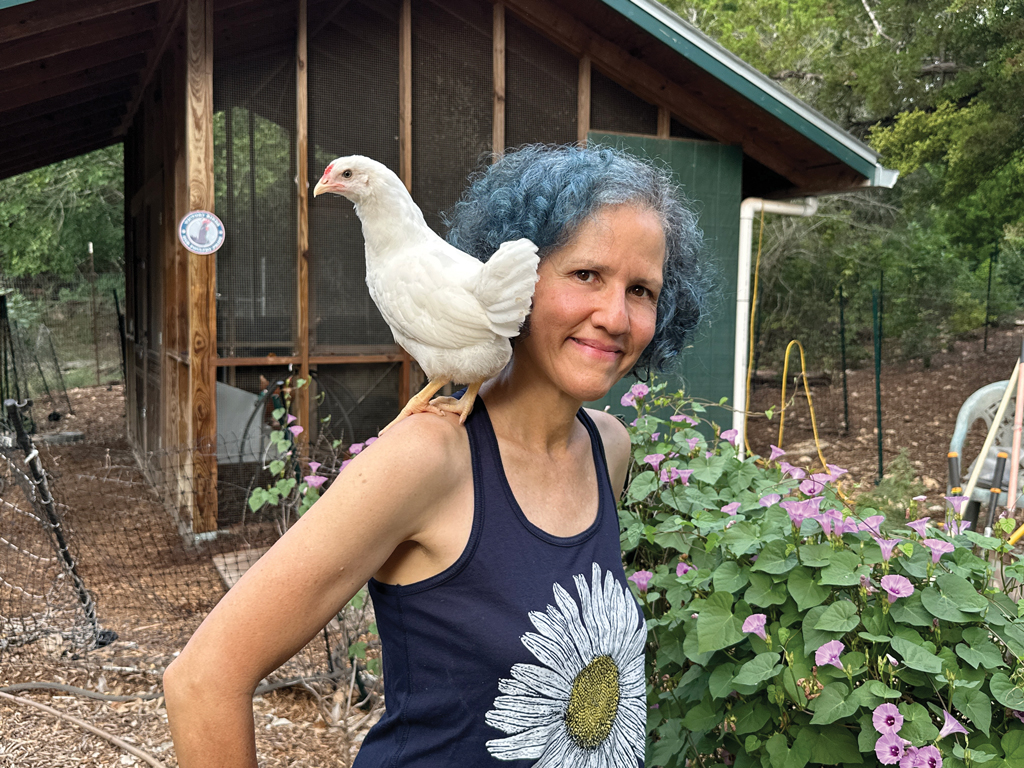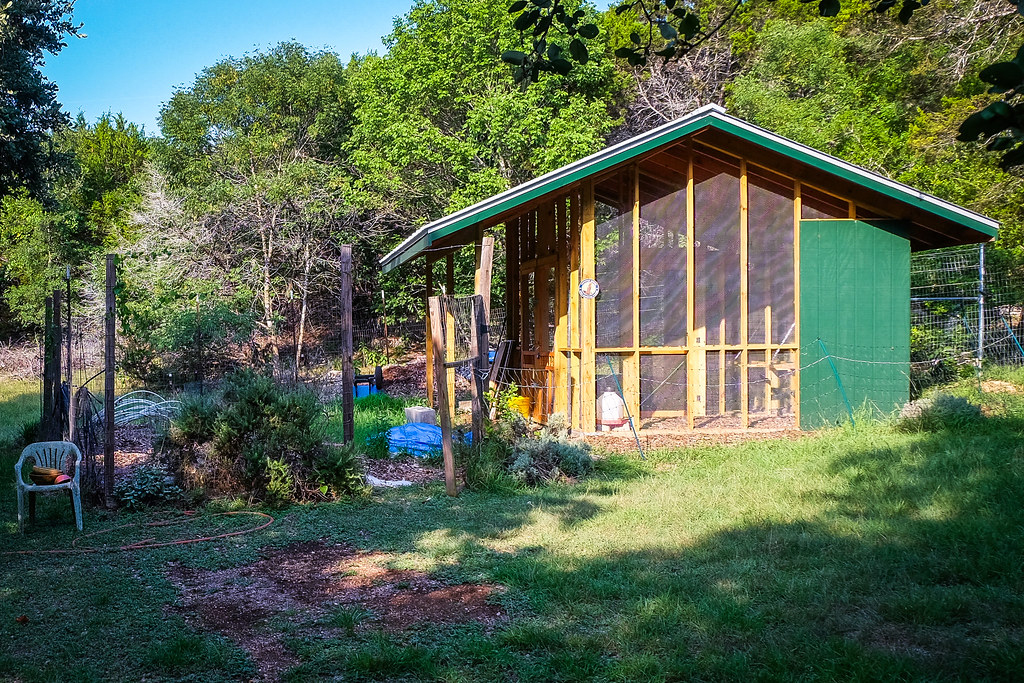Backyard Chicken Mama Michelle Hernandez touts recuperative coop benefits

A chicken takes Michelle Hernandez under its wing. Raising chickens at her Spicewood home is about more than gathering eggs. Chickens keep you in good physical shape and ease mental stress, Hernandez said. Courtesy photo
Michelle Hernandez is a self-proclaimed “Backyard Chicken Mama.” For over 20 years, she has raised chickens as pets and for food, but has learned along the way that her fine-feathered friends help keep her in good physical condition and manage her stress.
“Raising chickens elevates the well-being of the person caring for the chickens,” said Hernandez, who lives on a lush piece of property outside of Spicewood. “It is a calming activity and promotes increased movement.”
When she’s not caring for or interacting with her chickens, Hernandez is a wellness coach focused on educating and empowering women through strength and health. Her job and her hobby go together hand in chicken foot.
“Just from being outside with the chickens, you’re getting sunlight and fresh air, vitamin D, and it helps you in waking up as well as falling asleep, and regulates hunger levels,” Hernandez said. “It is a calming activity and promotes increased movement.”
Studies done by the National Institutes of Health at nursing homes that have installed chicken coops and chicken education programs prove the point, she added.
“The contentedness of the residents goes up because there’s that connection and possible fondness of going back to remembering younger days,” she said. “And they gain some responsibility with caring for the chickens.”

Becoming a chicken mom or pop takes just a few steps, starting with making sure its legal to have backyard chickens where you live—kind of a chicken-and-egg situation.
“If you become excited and go the whole route, buying a coop and finding chickens, and then realize you can’t have them, you could lose it all,” Hernandez said. “That would be heartbreaking and frustrating.”
Next step: Count your chickens before you build your coop.
“You need to do your chicken math to decide how many chickens you can raise based on the amount of space you have,” said Hernandez, suggesting first-timers start small.
“Be sure to make your coop big enough to accommodate at least four chickens, the ideal number, with a potential to add more if you can and want to,” she said. “They are social animals and perform better with friends.”
Don’t wing it when it comes to keeping foxes out of the hen house, she continued. Chicken wire, despite the name, is not necessarily the best way to enclose a chicken coop. Hernandez recommends hardware cloth to keep out coyotes, bobcats, racoons, and snakes.
Chickens also need shade and water, but don’t blow your nest egg on air conditioning. You can cool your chicks by hosing down or placing frozen plastic water bottles in their hay. When the temperature drops, try a portable space heater, but friends of a feather usually huddle together for warmth and do just fine unless freezing weather persists.
Raising chickens is a give-and-take relationship, said Hernandez, who has easily managed to pull it off by picking the right birds.
She chooses her chickens based on egg production, egg color, and personalities, which range from friendly to high-strung and from crabby to docile. Chicken choice also dictates egg color, which makes a beautiful arrangement if putting all your eggs in one basket (although not recommended if done metaphorically).
A good choice for egg laying and color is the docile Buff Orpington, which lays a medium brown egg. If you’re looking for an exotic chicken made for Texas heat, try the Naked Neck, which lays a lot of good eggs with light brown shells and is family-friendly.
“A lot of people like blue eggs, which you can get from Easter Eggers, Cream Legbars, and Araucana chickens,” Hernandez said.
Australorps, Rhode Island Reds, and Copper Marans lay brown eggs ranging from light to dark, respectively. Sage Eggers produce pale green orbs. All are known as friendly birds.
If eggs are the goal, no need to comb the catalogs for a rooster, but you might want to consider one anyway. A rooster provides a sense of order to a chicken family, Hernandez said. He is protective and shares his noisy “cock-a-doodle-doo” when all is not right in the coop.
It’s hard to beat eggs as a benefit, but that’s not all chickens are cracked up to be. They are also good stewards of the land, eating leftovers, aerating soil while scratching for food, and depositing “black gold” fertilizer for gardens and grass.
The birds are also good conversation starters. Talking turkey about chickens can break down barriers when interacting with other people, who might not always see thigh to thigh, Hernandez said.
“Chickens bring people in with curiosity, and I like that,” she said. “The joy of raising chickens has been a journey for me, and it’s an ongoing journey. I want to be able to do it, not just now, but also 50 years from now.”
Physical fitness, mental wellness, and sustainability. Now that’s something to crow about.


